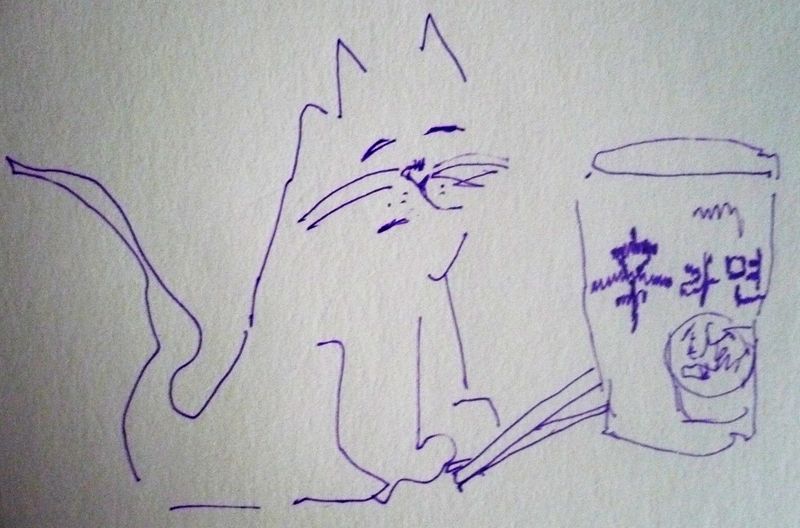I think watching old Korean TV dramedies is good for me. It helps me build my confidence with Korean – if not actually doing much to improve my proficiency, probably. I learn to recognize little bits of conversational Korean, and pick up intriguing bits of vocabulary. Plus, they’re mindlessly entertaining and occasionally quite funny, and provide good cultural insights too, keeping me positively engaged in the culture, in a way that working at hellbridge certainly fails me.
They’re probably a better way to kill time than to sit around feeling gloomy or depressed about my work, due to how overwhelming it feels. Or beating myself up over not actually spending time studying Korean intensively with all those Korean textbooks I’ve bought.
Anyway, the series I’m watching right now (옥탑방 고양이= oktappang goyangi =”Rooftop-room Cat”) is nothing spectacular. I downloaded it originally based strictly on the cute name – I like cats and I like the Korean word for cat (고양이, besides which I live in the near-homonymous city 고양).
So I went off looking for the script because there was a word I wanted to figure out, and learned that the lead actress is one of the seemingly many Korean pop-culture types that have committed suicide in the last several years. There seems to be an epidemic of it, at least based on how people talk about it. It’s kind of sad.
On the website about the series, I saw the following notice: “故 정다빈양의 명복을 빕니다.” It was strikingly somber, in black and white, unlike the garish colors normally employed on Korean websites. And it had a hanja (故). Hanja is the use of Chinese characters in Korean writing, which is quite rare except in higher-register news articles, and it clearly wasn’t a name, since it was directly followed by the name of the actress (정다빈). That made me think, too, that the content was more “formal” than is normally found on Korean entertainment websites. So I intuited it’s meaning, and went off a-googling.
And sure enough, imdb told me she had committed suicide. The language of the notice is roughly, “lamented Jeong Da Bin -[some kind of ending, genitive?] pray for the repose of the deceased (i.e. RIP).”
I never found the script. MBC (the network that made the series) doesn’t make the scripts easy to find, at least for someone with limited Korean language proficiency like myself. That’s why I like KBC shows better — their website makes it easy to see the scripts of the old shows. But I figured out the phrase I was wondering about, anyway, by playing it over a few times and typing what I heard into naver’s online dictionary: 도둑고양이= dodukgoyangi =”burglar-cat” i.e. stray cat.
The other thing that I caught was the term 컵라면(= keopramyeon =”Cup Ramen”). Instant ramen noodles in little cups (just add hot water) are endemic, here. And there’s nothing novel about the term. What I noticed for the first time was the pronunciation of the term in rapid speech. Despite being a hybrid of English (컵 keop cup) and Japanese (라면 ramyeon ramen) borrowings, it still undergoes the very native allophonic convergence at the intersection of the first and second syllables, so that it is pronounced not /keop-ra-myeon/ but rather /keom-na-myeon/. The terminal /p/ and inital /r/ shift to nasal versions, but retain their points of articulation. It’s entirely regular in Korean, but as can be seen, it makes recognizing borrowings from other languages a bit difficult in spoken form. Now, there’s a sort of coolness only a truly geeky linguist-type could appreciate.

![]()
